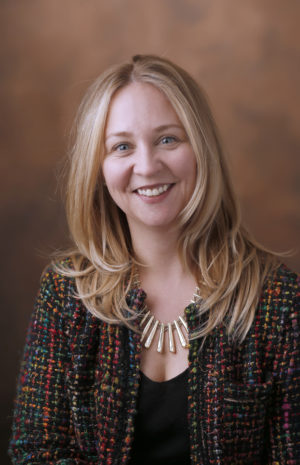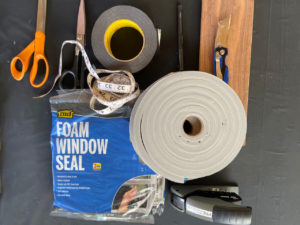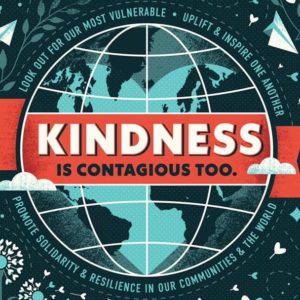Communication Studies Professor Organizes Pandemic Help for Healthcare Workers
Claire Sisco King will be the first to say that she isn’t an activist. But, looking at her pursuits over the past six weeks, you might have a hard time envisioning her as anything but. From working with physicians to create a petition for stay-at-home orders in Tennessee to her current campaign to provide resources to local healthcare workers, the associate professor of communication studies has become a mighty force in the fight against COVID-19 .

King’s affection for Nashville started in the late 90’s, when she would visit her now-husband at his family’s home outside of Nashville. Now a middle Tennessean teaching at the College of Arts and Science, she has become fully invested in the city, the university, and her community.
When a tornado hit Nashville in early March, she was up early the next morning sorting through debris and rubble, helping their East Nashville neighborhood recover, while her husband headed to work at an area hospital. In the midst of that recovery, the coronavirus made its way to Nashville and the Vanderbilt campus.
As Vanderbilt’s campus began to shut down, King shifted her course online. Her husband, a Vanderbilt-trained critical care physician in Gallatin, found himself on the frontlines battling the virus. King knew their family and work lives were about to change drastically. So, she and her husband made the tough decision to split their family apart to keep themselves safe. King and their three children moved to her parents’ condo in Florida, while her husband stayed in their Nashville home.
“After the tornado, we were surrounded by people, often in larger gatherings, for nine days straight. On the last of those days, we realized that COVID was here and real. We went from 60 to zero in a second, and it was such a strange and abrupt change,” King said.
Despite the upheaval it caused in her family, King recognizes how fortunate her position is. She is teaching one class this semester and can do it remotely. She has family who have taken her in. King knows that she has much to be grateful for—and that many others have found themselves in much harder situations. This mindset of thankfulness and empathy is what drives King to work for those facing more urgent and vital challenges.
King knew another physician’s spouse with three children who was in a similar situation, and invited the foursome to shelter in place with her in Florida. After a few days of settling in, King and her new roommate, Jen Martin—who is also a Vanderbilt-trained physician—dcided to find a way to help “flatten the curve.” The two came up with the hashtag #FlatTNtheCurve and created an online petition urging Tennessee Governor Bill Lee to issue statewide stay-at-home orders. Initially, they hoped to get 100 signatures. But when former U.S. Senator from Tennessee Dr. Bill Frist publicly signed the petition in early April, they watched the number skyrocket to more than 35,000 signatures. King and Martin knew they were on the right track, and immediately began to think of more ways to help.

“The larger concern was for public safety, but it was also very personal for us. Once it became clear that people were taking seriously the call to stay home, our concern was really focusing on both the physical safety and mental well-being of healthcare workers,” King said. They found a solution in their hometown sewing circles.
“Jen and I are both from the South, so sewing and knitting are a really big part of the culture we grew up with,” King said. Without a sewing machine themselves, they decided the best way they could help was to encourage others to sew cloth masks.
This community of makers has been able to produce as many as 500 masks in a single day, and distribute them to hospitals back in Nashville. Medical professionals are using theses masks in less critical situations, such as between patient visits, freeing up medical-grade masks for direct patient care.
But King hasn’t stopped there and is now focused on face shields. She has shared information about how to make those materials using 3-D printers so people with printers can do the same. She herself does not have a 3-D printer, so she had to find another way to help. “Because we don’t have [3-D] equipment, we were able to find a template for making face shields that use really simple parts; that will be our weekend project with the kids. Using plastic sheets, foam adhesive, and duct tape, we’re going to make hundreds of them and ship them. It’s a simple way to make equipment that can be helpful and get our kids involved in the effort,” King said.

While she does her best to help meet the physical needs of medical professionals, King is also aware of the unique mental health challenges they currently face. She has been trying to connect healthcare workers with mental health professionals by compiling a list of counselors, therapists, and psychiatrists who are willing to volunteer tele-sessions. For those healthcare workers who are not yet ready to speak with mental health professionals, King is trying to collect other mental health resources that might be of value to them and sharing them on a Facebook page she created.
“Part of their work involves compartmentalizing some of their feelings to keep doing their job,” King said. “So, we’re also trying to get them links to other resources like meditation sites or yoga videos—things that can help them to connect mind and body in a way that could reduce their anxiety.”
All her efforts are part of a larger desire to come out of this situation with more gratefulness and kindness. King hopes to help people see the big impact of contributing in small ways. She knows that one day her role as an activist and advocate will be over. But, if she has her way, the impact of her efforts will remain, and the thoughtfulness and empathy we’ve generated during this crisis will stay with us.
